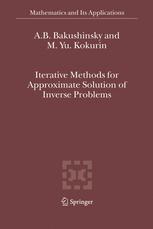

Most ebook files are in PDF format, so you can easily read them using various software such as Foxit Reader or directly on the Google Chrome browser.
Some ebook files are released by publishers in other formats such as .awz, .mobi, .epub, .fb2, etc. You may need to install specific software to read these formats on mobile/PC, such as Calibre.
Please read the tutorial at this link: https://ebookbell.com/faq
We offer FREE conversion to the popular formats you request; however, this may take some time. Therefore, right after payment, please email us, and we will try to provide the service as quickly as possible.
For some exceptional file formats or broken links (if any), please refrain from opening any disputes. Instead, email us first, and we will try to assist within a maximum of 6 hours.
EbookBell Team

0.0
0 reviewsThis volume presents a unified approach to constructing iterative methods for solving irregular operator equations and provides rigorous theoretical analysis for several classes of these methods. The analysis of methods includes convergence theorems as well as necessary and sufficient conditions for their convergence at a given rate. The principal groups of methods studied in the book are iterative processes based on the technique of universal linear approximations, stable gradient-type processes, and methods of stable continuous approximations. Compared to existing monographs and textbooks on ill-posed problems, the main distinguishing feature of the presented approach is that it doesn’t require any structural conditions on equations under consideration, except for standard smoothness conditions. This allows to obtain in a uniform style stable iterative methods applicable to wide classes of nonlinear inverse problems. Practical efficiency of suggested algorithms is illustrated in application to inverse problems of potential theory and acoustic scattering.
The volume can be read by anyone with a basic knowledge of functional analysis.
The book will be of interest to applied mathematicians and specialists in mathematical modeling and inverse problems.